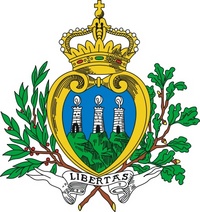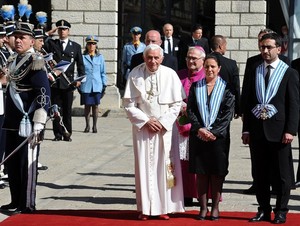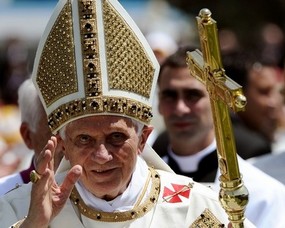
Yesterday Pope Benedict visited San Marino. You remember, San Marino is the oldest republic founded by Saint Marin, a deacon, and Saint Leo who escaped the clutches of the Emperor Diocletian by coming from Dalmatia to Rimini. San Marino is in central Italy with about 24 square miles with a population of about 31K. San Marino was first founded as a monastic community in the early period of the 4th century and today it is governed by a constitution adopted in 1600 and is still in effect. Two interesting facts: Saint Agatha is the patron saint and Abraham Lincoln was an honorary citizen.
Follow the Pope in a historical way (even spiritually) who'll notice his insistence on Europeans --indeed all nations with Christian roots-- preserving and appreciating Christian tradition as the moral ground of society. There's a tendency today to push aside one's Christian patrimony in favor of a secularist mentality that rejects Christ and His Gospel. It seems that we are now embarrassed by our belief in Christ; we longer say with confidence that Christ died for me and that He's now risen from the dead and that the Holy Spirit lives in us; that we are scared by what others are going to say and I dare say we'd rather be superficial and believe in nothing than accept the offer of Love from God. Why is it that Christ, who is the source of our being and our destiny is easily dismissed?
In San Marino, Pope Benedict exhorts us all to hold fast to what has been given to us: freedom, love, and meaning.
My heartfelt gratitude for your hospitality, in particular I express my gratitude to the captains regent, also for the courteous words they addressed to me. I greet the members of the government and of the Congress, as well as the diplomatic corps and all the other authorities gathered here. In addressing you, I embrace ideally the whole people of San Marino. From its birth, this republic has had friendly relations with the Apostolic See, and in recent times they have been intensified and consolidated; my presence here, in the heart of this ancient republic, expresses and confirms this friendship
.

More than 17 centuries ago, a group of faithful, won over to the Gospel by the preaching of Deacon Marin and his witness of holiness, gathered around him to give life to a new community. Continuing with this valuable heritage, the people of San Marino remained always faithful to the values of the Christian faith, firmly anchoring to them their own peaceful coexistence, according to criteria of democracy and solidarity. Down through the centuries, your ancestors were aware of these Christian roots and were able to make fruitful the great moral and cultural patrimony they had received, giving life to an industrious and free people. Despite the exiguity of the territory, [San Marino] has not failed to offer the bordering populations of the Italian peninsula and to the whole world a particular contribution of civilization, marked by peaceful coexistence and mutual respect.
Addressing you today, I rejoice to see your attachment to this patrimony of values and I exhort you to preserve and appreciate it, because it is at the foundation of your most profound identity, an identity that asks to be fully assumed by the people and institutions of San Marino. Thanks to it, a society can be built that is attentive to the true good of the human person, to dignity and liberty, and capable of safeguarding the right of all peoples to live in peace.
These are the foundations of a healthy laicism, within which civil institutions must act with a constant commitment to the defense of the common good. The Church, respectful of the legitimate autonomy that civil authority must enjoy, collaborates with it, at the service of humanity, in the defense of humanity's fundamental rights, of those ethical instances that are inscribed in his very nature. Because of this, the Church is committed to legislation that always promotes and protects human life from conception to its natural end.
Moreover, it requests due recognition and active support for the family. In fact, we know how the family institution is currently being called into question, as if in an attempt to ignore its inalienable value. Those who suffer the consequences [of these efforts] are the weakest social groups, especially the young generations, who are more vulnerable and thus easily exposed to disorientation, to situations of self-marginalization and to the slavery of addictions. Education institutions often seek to give young people adequate answers, and see the diminishing support of the family as an obstacle to normal integration into the social fabric. Because of this, it is importance to recognize that the family, just as God has constituted it, is the main institution that can foster harmonious growth and the maturity that makes individuals free and responsible, formed in deep and perennial values.
In the predicament of economic difficulties in the Italian and international context, which also affects the San Marino community, I wish my words to be of encouragement. We know that the years following the Second World War were a time of economic restrictions, which obliged thousands of your fellow citizens to emigrate. Then a period of prosperity arrived, in the wake of developing the industries of trade and tourism, especially in that type of summer enjoyed so close to the Adriatic coast.
During this phase of relative abundance there was a certain loss of the Christian sense of life and of fundamental values. However, the San Marino society manifests again a good vitality and conserves its best energies, proof of this are the many charitable and voluntary initiatives to which numerous fellow citizens of yours are dedicated. I would like to recall also the numerous San Marino missionaries, lay and religious, who in the last decades have left this land to take the Gospel of Christ to various parts of the world. Not lacking, hence, are the positive forces that enable your community to address and overcome the present situation of difficulty. To this end, I hope that the question of border workers, who see their own occupation endangered, will be able to be resolved taking into account the right to work and to the protection of families.

Also in the Republic of San Marino, the present crisis leads to a need to plan for the future, and it becomes a moment for discernment (cf. Caritas in Veritate, 21); in fact, it puts the entire social fabric before the impelling need to address the problems with courage and a sense of responsibility, with generosity and dedication, making reference to that love of liberty that distinguishes your people. In this regard, I would like to repeat the words addressed by Blessed John XIII to the Regents of the Republic of San Marino during an official visit to the Holy See: "The love of liberty," said my Predecessor, "boasts exquisitely among your Christian roots and your ancestors, picking up their true meaning, taught you not to ever separate their name from that of God, who is its irreplaceable foundation" (Addresses, Messages, Conversations of the Holy Father John XIII, I, 341-343: AAS 60 [1959], 423-424.
This warning maintains its everlasting value still today: the liberty that institutions are called to promote and defend at the social level is manifested more profoundly by the Spirit of God, whose life-giving presence in the human heart gives the ability to [individuals to] direct themselves toward and dedicate themselves to the good. As the Apostle Paul affirms: "for God is at work in you, both to will and to work for his good pleasure" (Philippians 2:13). And St. Augustine, commenting this passage, stresses: "It is true that we are the ones who will when we will, but He is the one to make us will the good." It is God, he says, adding, "The steps of man will be directed by the Lord, and man will want to follow his way" (De gratia et libero arbitrio, 16, 32).
Hence to you, illustrious gentlemen and ladies, is the task to build the earthly city in the due autonomy and respect of those human and spiritual principles to which every individual citizen is called to adhere with all the responsibility of his own personal conscience and, at the same time, the duty to continue to operate actively to build a community founded on shared values.
Most serene captains regent illustrious authorities of the Republic of San Marino, I express from my heart that your whole community, in the shared civil values and with their specific cultural and religious peculiarities, will be able to write a new and noble page of history and become ever more a land in which solidarity and peace prosper. With these sentiments I entrust this beloved people to the maternal intercession of Our Lady of Graces and I invoke from my heart on all and each one the apostolic blessing.


Leave a comment